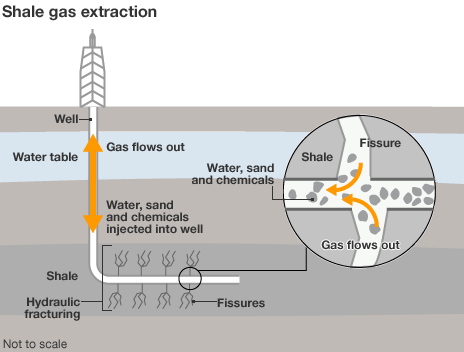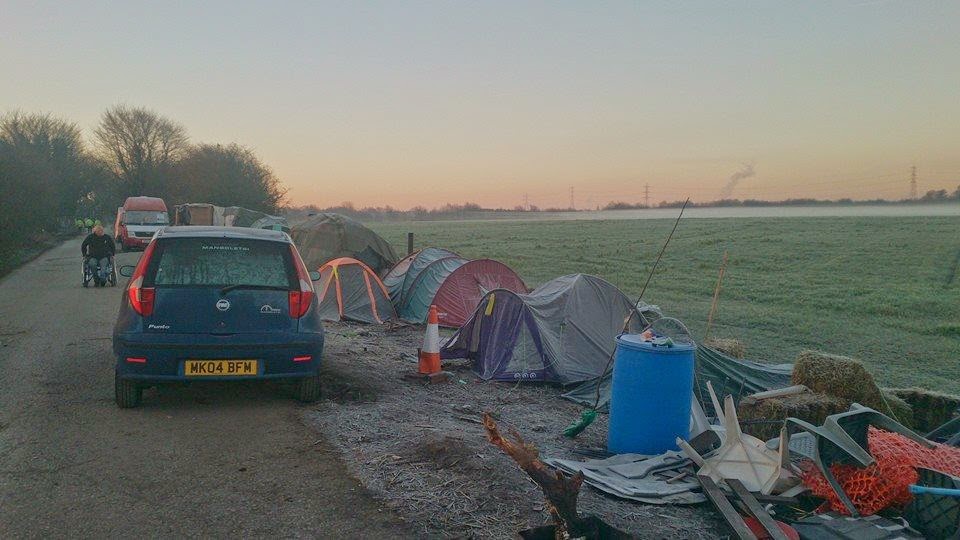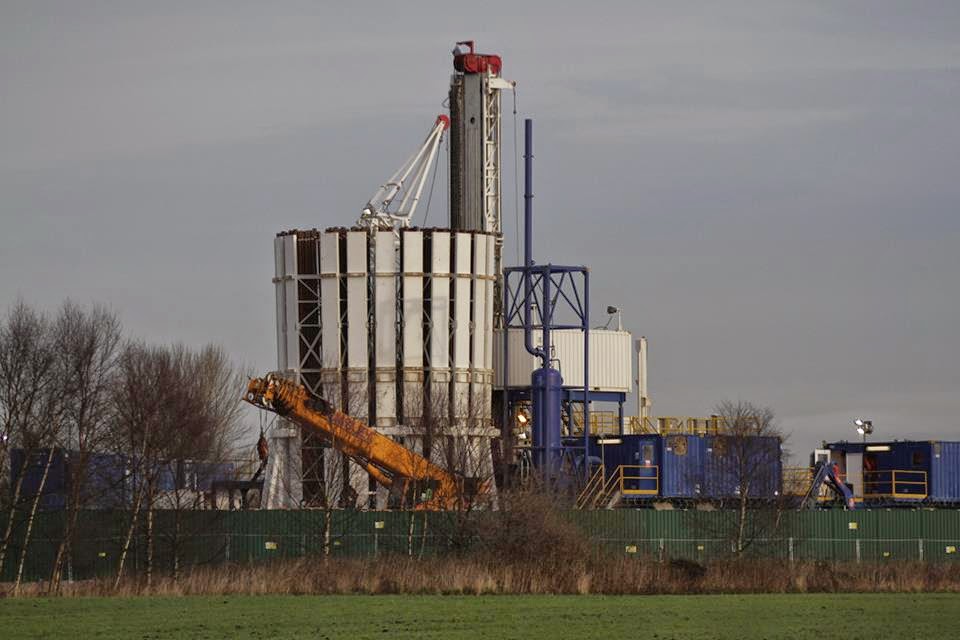| A traditional northern welcome for Igas |
Then came the massed ranks of the
regular coppers, debussing from their line of vans and forming up in lines.
Behind them, keeping their distance, were the even less charismatic Tactical
Assistance Unit (TAU).
The day's convoy was not far
behind, a lorry load of what looked like junk and another with some sort of
pumping equipment, bracketed front and rear by police vans. Faced with an
immovable line of protesters it was soon stopped dead.
This was Day One of the Northern
Gas Gala.
Barton Moss really is the edge of
town. On one side is the great Manchester, Salford and Stockport urban
conglomeration. On the other it is countryside as far as Warrington.
Historically, Stephenson’s Rocket once ran along the nearby railway. It has the
first canal in Britain, the Bridgewater, and also the last, the Manchester Ship
Canal. Now it is the front line of the new technology of hydraulic fracturing.
 Fracking is
a form of unconventional oil that is currently the target of resistance from
campaigners around the world. Their concerns are the air pollution, noise, gas
flaring and large number of lorries associated with a fracking site, large
amounts of clean water that needs to be brought in and large amounts of waste water
needing to be taken out. They fear underground bore holes can crack and methane
can end up where it’s not wanted: in the atmosphere, in the ground water and in
people.
Fracking is
a form of unconventional oil that is currently the target of resistance from
campaigners around the world. Their concerns are the air pollution, noise, gas
flaring and large number of lorries associated with a fracking site, large
amounts of clean water that needs to be brought in and large amounts of waste water
needing to be taken out. They fear underground bore holes can crack and methane
can end up where it’s not wanted: in the atmosphere, in the ground water and in
people.This combination of local and global concerns makes the anti-fracking movement a diverse one and that was reflected by the crowd gathered on that first morning. A makeshift camp had sprung up on the verge next to Barton Moss Lane and the campers had been joined by local supporters.
The famous Manchester rain was absent, but the Greater Manchester Police
and were present in force. A quarter of the mile down the lane the onshore oil
and gas company Igas had built a secure compound in which they were preparing
for a drilling operation to determine whether or not the area was suitable for
fracking.
| Day One of the Northern Gas Gala |
Then the
pushing started. Slowly the police moved the blockade of young and old, men and
women down Barton Moss Lane. Some people pushed harder than others, and soon
the first arrests were being made.
Rob Edwards
from Glossop had become the first arrest of the campaign the previous day. He
turned up again the next day and promptly became the second person to be
arrested as well.
Finally, two
hours after the operation started, the convoy of vehicles was safely in the
Igas compound.
That first
day set the tone for the first month of the campaign: the ‘slow walk’, the
pushing and the arrests – a suspiciously regular five a day, which usually
occurred just after the ritual change over from regular police to TAU.
 |
| Anne Power, superhero |
Anne’s
arrests did not endear GMP to the Protectors of Barton Moss, as the campaigners
styled themselves. Neither did an incident on Friday 13th December
when police plunged into the crowd to make a seemingly random arrest,
propelling disabled Protector Chris Pannel into a ditch in the process and
breaking his leg.
Meanwhile the Manchester weather
did its bit to make the Protectors’ lives as challenging as possible. The
Christmas storms blew away tents and left the composting loos leaning at a
jaunty angle. A delivery of hay bales made the situation tolerable, but life on
the Moss was a daily struggle for survival. But still the ‘slow walks’ went on,
interspersed with regular lock-ons and the occasional stunt such as Father
Christmas delivering a wind turbine to the Igas gates.
FLAREGATE
Then at the
start of January everything changed.
The first
the Protectors knew about it was when someone spotted a report on the Greater
Manchester Police Facebook page of a flare being fired at a GMP helicopter
landing at nearby Manchester City airport. Nobody in camp saw anything and it
was assumed this might have been a New Year’s Eve firework someone had let off
late from one of the nearby housing estates.
However the
police immediately put out a statement saying the flare had been fired from the
camp with the intent of bringing down the helicopter, with an ominous reference
to the fatal crash in Glasgow the previous November. Two days later the camp
was searched, but no evidence was found. Inquiries in the Brookhouse and Irlem
estates, and an appeal to drivers on the busy A57 that passed the airport,
failed to produce any other witnesses, but GMP continued to report that it had
been deliberately fired at the helicopter by the camp.
 |
| Barton Moss drill site |
However the
police were definitely not laughing now. Arrests became more regular and more
violent. And also more bizarre. Dr Steven Peers, for example, was arrested for ‘drink
driving’ whilst sober and on foot. Equally strange was the police turning up
and filling the holes dug by the Protectors for their ablutions with concrete.
Meanwhile there was a steady flow of Protectors being taken away in ambulances
after suffering various unfortunate interactions with the police.
 |
| GMP remove the Public Footpath sign |
With most of
the arrests made being for Obstruction of the Public Highway, this was a very
important point. These charges would only stand if Barton Moss Lane was indeed
a Public Highway. The courts, which had been taking an increasingly dim view of
GMP tactics and which were regularly releasing campaigners on unconditional
bail even if they had been arrested for breach of previous bail conditions,
would have to decide.
POLITICAL BACKLASH
However the
police weren’t the only people having a pop at the Protectors.
 |
| Rally at Barton Moss |
The media had chosen that morning to
descend on us in force. We had Daybreak TV, Channel 4, local BBC, a freelance
snapper and others. Various Protectors were interviewed, but for once the main
story wasn't us. Instead the real news that day was that the opposition, AWOL
for the last three months, had finally showed up.
The Igas PR machine had been sounding like a stuck
record since November, claiming the Protectors were disrupting local people
whilst the media was clearly showing local people disrupting Igas. However the rest
of the fracking industry was not intending to take all this lying down.
Consultants Control Risks had produced a report of the
anti-fracking movement. It ended with four recommendations for overcoming the
opposition. Firstly, acknowledge past grievances; secondly, engage with
communities; thirdly, reduce impacts and fourthly, create more winners.
Interesting, then, what happened that
Monday morning in January.
Lord Browne, former boss of climate
villains BP, chair of fracking company Cuadrilla and advisor to the Cabinet was
on the TV acknowledging that “it’s not
all been perfect in the USA” and promising tougher regulations here. The
Prime Minister appeared at a fracking site in Lincolnshire to announce that
councils could keep twice the usual amount of Business Rates from frackers.
There was no community engagement, but Igas had been doing a bit of that,
although they would soon get bored.
 |
| Theo Simon on a lorry |
But were actions louder than words, or
would the government and industry spin machine win out? Time would tell.
TRESPASS ON A PUBLIC FOOTPATH
On Wednesday
12th February, Judge Khalid Qureshi, in Manchester Magistrates
Court, finally ruled that Barton Moss Lane was a Private Road and Public
Footpath and not a Public Highway. Greater Manchester Police had by now
arrested over a hundred people and it looked like they would have to drop the
charges against almost all of them.
For two days
after the ruling no convoy passed up or down the lane.
(2).jpg) |
| Vanda Shivett arrested 15 Feb 2014 |
The police
were now making arrests for the crime of Aggravated Trespass. This offence,
from the notorious 1994 Criminal Justice and Public Order Bill, has been widely
used against environmental protesters in the past. However the bill clearly
defined trespass as only being possible on land to which the public did not
have access. As Judge Qureshi had ruled Barton Moss Lane was a Public Footpath,
this charge required the police to claim that the Igas lorries, or the police themselves,
somehow had priority over pedestrians on the footpath, a feat of legal
legerdemain that has no precedent.
THE MARCH IN MARCH
 |
| UK's largest anti-fracking rally |
At the start of March the campaign put the word out that we’d like a
little show of support by the people of Manchester. The result was a carnival
of 1500 people on the streets of England’s second city and it all ended peacefully
with everyone doing the hokey cokey outside the National Football Museum. Manchester was now a city united against
fracking.
| Bez at Barton Moss |
We were also starting to attract celebrity visitors to the camp
including Green Party leader Natalie Bennett, actress Maxine Peake and Happy
Mondays dancer Bez whilst legendary Hacienda DJ Dave Haslam put on a gig at the
camp.
However at the end of the month the government’s consultation on
extending the area of the UK available for fracking came to an end. Two thirds
of the country was now at risk, so whether you lived in a National Park or a
city, a leafy shire or an ex-industrial city, the odds were you could see a
fracking rig in your back yard. Maybe not soon, but sometime. The fight was
very much still on.
DEMOCRATIC DEFICIT
 |
| Cold morning on the Moss |
What should have been an “eight to twelve week” drill by Igas’s test
drilling finally came to an end at the start of April. According to
commentators on the London Stock Exchange web page, deep sea wells of the
Falkland Islands had been completed faster. One poster said “Absolutely no
way Barton Moss should have taken (is taking) so long to drill. And the delay
(about 300%) is down to so-called ‘lawful protest’. And such delay is very
expensive.” Maybe because of this their share price dropped 25%, knocking
£80 million off the value of the company.
Igas now intended to spend the next six months looking at their data
before deciding whether to apply for a license to come back and frack. Direct
action certainly appeared to be working, spooking the investors and cutting
through the spin to show people the truth about the industry. But in a
democracy direct action can’t succeed on its own.
 |
| Salford Council refuses to debate |
This was handed in at the end of February and by their own rules the council
now had to debate the issue. On 8th April discussing the petition
was on the agenda for Salford Cabinet. Come the day there were more campaigners
than there were places in the public gallery. Ali Abbas from Manchester Friends
of the Earth addressed the executives of Salford Council and then…..nothing.
Despite the largest rally against fracking in the UK, over 200 arrests and the
petition, Salford Council still refused to debate on the issue.
ALBION FRACKED?
| Sunset on Barton Moss camp |
For the Protectors who had survived the winter and the GMP, it was time to reflect. Then the job of cleaning up the site and moving people and equipment elsewhere then began. New camps had sprung up at Upton near Chester and at Daneshill in Nottinghamshire and more were planned. Anti-fracking groups are now springing up across the country like spring flowers, taking root in places that might not to be fracked for years.
Just like when Swampy and co. opposed the government’s road building
program in the 1990s, there will soon be a network of camps across the country
with a travelling army of campaigners opposing the drillers wherever they
appear. At Upton they are even building tree houses.
We haven’t won. Fracking is still coming, but it is coming slowly.
Whilst there may be an argument for gas as a window fuel to replace
coal whilst we develop low carbon alternatives, it all falls down when you
realise that no fracked gas has come out of the ground yet, and it might be ten
years before it does in any usable quantities. And that won’t do.
If we want to prevent dangerous Climate Change we need alternatives
now. We need as much wind and wave and solar as we can build, we need more
public transport and fewer planes, we need to save energy, use our energy
smarter and make more of it ourselves. Maybe carbon capture and storage will
work, maybe there is a role for nuclear, but whatever, we need this stuff now.
The climate cannot wait for us to ride out twenty years of fracking boom and
bust first.
Remember, once you frack you can’t go back.
To find out how to join the resistance go to:
To follow the
campaign in Manchester go to:
















